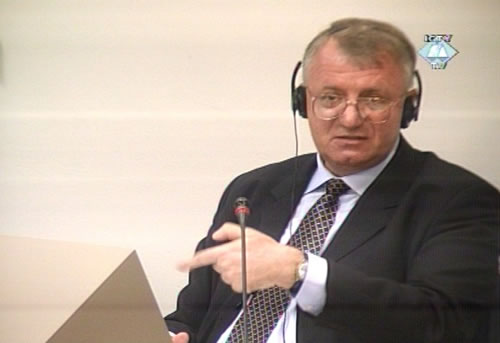Home
SESELJ'S VIEW OF THE WORLD
In the last ten minutes of his testimony at the Milosevic trial last week, Vojislav Seselj explained to the judges the geopolitical, strategic and economic importance of Serbia which lead the Western powers, led by the USA, to "want to weaken it as much as possible as the only state-forming element in the Balkans"
 Vojislav Seselj in the courtroom
Vojislav Seselj in the courtroom In the last ten minutes of his testimony at the Milosevic trial last week, Vojislav Seselj, leader of the Serbian Radicals, presented to the judges a brief outline of his theory of anti-Serb conspiracy. According to him it is the "crux of all issues" before ICTY. The view of the world he presented is important if one wants to follow and understand his testimony, set to continue tomorrow and to last at least two or three weeks.
In the background of all the developments in the former Yugoslavia in the last fifteen years or so, as Seselj explained in reply to a question by Judge Bonomy, is the "strategic interest of NATO to destroy Russia completely." The Western alliance, according to the geopolitical analysis of the Radical leader, "is not satisfied with breaking up the Soviet Union, but wants to break up Russia, too."
In order to achieve this goal, Seselj explained, NATO "sets up its strongholds in the Balkans, in the Ukraine, in Central Asia… and doesn’t want to have a factor it cannot rely on in its rear." According to him, Serbia is one such factor: "NATO sees in it a traditional Russian ally in the Balkans." That is why NATO wants to destroy Serbia "as a state, as a political factor and as a subjective power refusing to bow down to outside pressure." That's why, as Seselj says, "Serbia has always been a NATO target and that's why NATO has always supported Serbia's enemies in the civil wars waged in the region." The goal is to "weaken Serbia as much as possible as the only state-forming element in the Balkans."
According to Seselj's theory, the civil wars were in fact fought by Serbs against Serbs: Orthodox Serbs, Roman Catholic Serbs and Muslim Serbs, as both Croats and Muslims are "invented nations." Muslims, he goes on to explain, are "the descendants of the Serbs who converted to the Islam under the Turkish occupation, who speak Serbian language to this day." It is true, Seselj concedes, that "there was a small nation of people calling themselves Croats, but they were destroyed in the Turkish onslaught." What is termed "Croats" today, Seselj claims, are "mostly Roman Catholic Serbs whose mother tongue is Serbian, while the Croatian language is lost in the past."
Apart from wanting to weaken Serbia as a "traditional Russian ally" and the only "state-forming factor in the Balkans," NATO "wants to set up its bases in Kosovo and Metohija," according to Seselj's geopolitical analysis. The Western powers were motivated by that goal when they started the war in Kosovo, the war that "no one wanted: neither Serbs nor Albanians." Since "they knew that Serbs were good soldiers and that the death toll would be high," the Western countries, primarily the Americans, "wanted someone else to bleed to achieve their goals. They got that by organising and arming the Albanian terrorists", turning them into the "NATO infantry."
NATO ambitions do not stop at the borders of Serbia and Kosovo, he says. “NATO wants to build an oil pipeline through the territory of Macedonia to bring in oil from Central Asia, bypassing Bosphorus and the Dardanelles, since soon they will not be able to meet the demand for the passage of oil tankers." On the other hand, "NATO must soon withdraw its troops from Germany," Seselj says, going on to ask, "Where would they put them if not in the Balkans?". The pretext would be that these were "peace-keeping troops" deployed in a "war zone" in a "European hotspot."
As Judge Bonomy still could not see "what use it is to NATO to control Serbia", Seselj said that NATO today "controls all of Serbia," and provided some clarifications.
First of all, Seselj said, "because they control Serbia, they have one problem less to tackle as they progress eastwards. Second, they have an economic interest," in light of the "huge natural resources in Kosovo and Metohija: coal, zinc, millions of tons of nickel reserves…"
Because of all that, Seselj concluded his ten-minute geopolitical lecture, Serbia is today "seeing its tragic and bloody history repeat itself, and that is the crux of all the issues" before ICTY.
Judge Bonomy, who followed the lecture with great interest and disbelief, thanked the witness for his efforts to help him understand the "strategic and economic importance of Serbia."
Linked Reports
- Case : Milosevic Slobodan - "Kosovo, Croatia and Bosnia"
- 2005-08-19 THE WITNESS'S DAUGHTER VANISHES
- 2005-08-19 SESELJ, GREATER SERBIA AND HOOLBROKE'S SHOES
- 2005-08-18 ANOTHER ALBANIAN AS MILOSEVIC'S DEFENCE WITNESS
- 2005-08-23 WILL MILOSEVIC BENEFIT FROM SESELJ'S TESTIMONY?
- 2005-08-24 SESELJ VILIFIES DRASKOVIC AND DJINDJIC
- 2005-08-25 LARGER, NOT GREATER SERBIA
